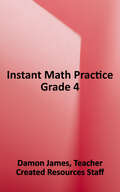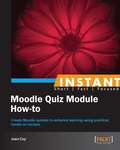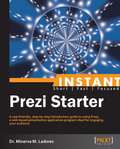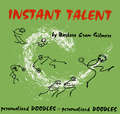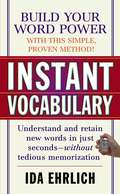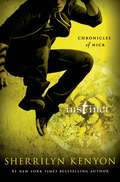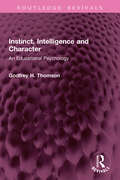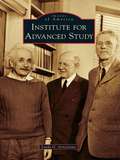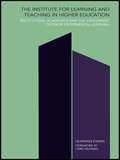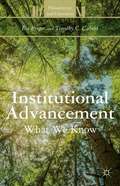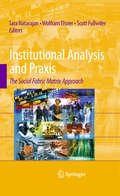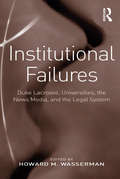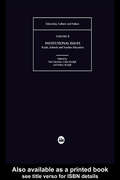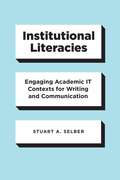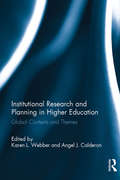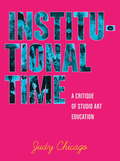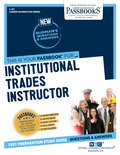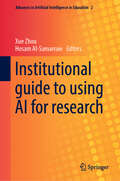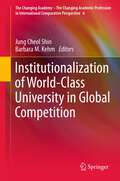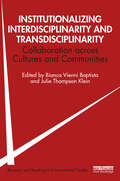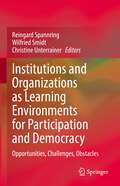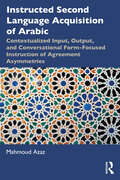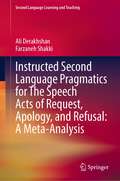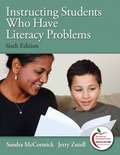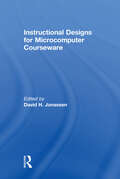- Table View
- List View
Instant Math Practice Grade 4
by Teacher Created Resources Staff Damon JamesThis series offers a quick and easy way to supplement your math curriculum to meet Common Core Standards. Over 120 practice pages cover the key areas: Number and Operations, Algebra, Geometry, Measurement and Data, and Problem Solving. Each page addresses a specific topic, and many activities offer multiple ways to find solutions.
Instant Moodle Quiz Module How-to
by Joan CoyStep-by step application of the features of Moodle Quiz provides a good grounding in creating effective assessment FOR and OF learning. If you are doing any kind of instruction using Moodle as your Learning Management System, this book is for you! Strong assessment is one of the keys to effective instruction and successful learners. Readers are expected to have a basic working knowledge of Moodle and access to a course they are instructing.
Instant Prezi Starter
by Minerva M. LadoresGet to grips with a new technology, understand what it is and what it can do for you, and then get to work with the most important features and tasks. A starter guide to learning how to create presentations with Prezi.Instant Prezi Starter takes you through the first steps of learning how to use this amazing web-based tool! If you are tired of your same old presentation tools and are looking to wow your audience, then this book is for you! If you surf the Internet, you're all set. If you have created a website, wiki, or blog, then you're in even better shape! Enjoy!
Instant Talent
by Barbara Cram GilmoreInstant Talent is indeed an unusual book! Is it for kindergarten children? Teenagers? Adults? The author says it's for people who claim they can't "draw a straight line" as well as for those who doodle. It's silly, but great fun!
Instant Vocabulary
by Ida EhrlichLEARNING NEW WORDS IS AS EASY AS ONE, TWO, THREE! RECOGNIZE the keys to the English language, the basic units from which all words are made FOLLOW clear examples of how the key explains a word's origin and meaning -- or how it combines with other keys to create new words BUILD your word power with practical exercises to expand and integrate your knowledge, without memorization Why enroll in an expensive course when everything you need to increase your vocabulary is at your fingertips? With this tested step-by-step method, you can instantly understand and retain thousands of words -- even words you have never seen before. By examining the building blocks of all words, a basic skill you already use every day without realizing it, you can unlock the meaning behind any word. A strong vocabulary is essential for academic and career success, greater self-confidence in speaking and writing, and improved reading comprehension. Master the secrets of increased word power with Instant Vocabulary!
Instinct (Chronicles of Nick #6)
by Sherrilyn Kenyon<P>Being a teen is never easy. . . Zombies, demons, vampires, shapeshifters-another day in the life of sixteen-year-old Nick Gautier-and those are just his friends. <P>But now that he's accepted the demon that lives inside him, he must learn to control it and temper the very emotions that threaten the lives of everyone he cares for. Something that's hard to do while trying to stay off the menus of those who want his head on a platter. And no one wants him more than the dark gods who created his race. <P>Now that they know where he is, they will stop at nothing to reclaim him. And without knowing it, Nick has just embraced the one person he should never have trusted. The one person who will hand him over to his enemies to get back the life they lost. <P>Nick has finally accepted his fate, now he must learn to defy his destiny, and the dark, deadly forces that will stop at nothing to destroy everyone he loves so that they can again return to the world of man and own it, in the next Chronicles of Nick novel, Instinct, from #1 New York Times bestselling author Sherrilyn Kenyon.
Instinct, Intelligence and Character: An Educational Psychology (Routledge Revivals)
by Godfrey H. ThomsonFirst published in 1924, Instinct, Intelligence and Character provides a lucid and forcible account of the currents of thought in educational psychology, from intelligence tests to psychoanalysis, from character training to the laws of learning. It brings themes such as talk on instincts and habits; laws of heredity; nature of satisfaction and dissatisfaction; the learning process; interests and prejudices; individual differences in intellect; general and special abilities; differences in will and temperament; and the wings of thought. This historical reference work is useful for teachers and students of educational psychology.
Institute for Advanced Study
by Linda G. ArntzeniusFounded in 1930, the Institute for Advanced Study was conceived of high ideals for the future of America and its system of higher education, and was made possible by sibling philanthropists Louis Bamberger and Caroline Bamberger Fuld. Guided by education expert Abraham Flexner, the Bambergers created an independent institution devoted to the pursuit of knowledge. The Institute for Advanced Study opened its arms to scholars "without regard to race, creed, or sex." It provided a haven for Jewish intellectuals fleeing Nazi Germany, including Albert Einstein, who remained on the permanent faculty until his death in 1955, and became the intellectual home of such luminaries as J. Robert Oppenheimer, John von Neumann, Kurt Gödel, Marston Morse, Oswald Veblen, Hermann Weyl, Homer A. Thompson, Erwin Panofsky, George F. Kennan, Clifford Geertz, and Freeman Dyson.
Institute for Learning and Teaching in Higher Education: Institutions, academics & assessment of prior experiential learning
by Norman EvansThe Institute for Learning and Teaching in Higher Education (ILT) was launched in 1999 as a result of the recommendations of the Dearing committee. It is the only national body in the world which promotes the quality of teaching and learning in higher education. This book has four purposes:* to provide the background story to the evolution and establishment of the ILT* to document the central role of the assessment of prior learning (APL)* to support the institutions and individuals who are moving to engage with the ILT and in particular take the APL route for the first time* to speculate on the possible consequences of the ILT itself and APL within it. The ILT is a professional membership organisation which is open to all institutions and academics. This book will be of interest to all those who teach and support learning in higher education.
Institutional Advancement
by Eve Proper Timothy C. CaboniInstitutional Advancement reviews published empirical research on advancement in higher education, 1991-2013, and explores the field of higher education administration known as institutional advancement, a field that includes fundraising, alumni relations, public relations and marketing. Also called "development," this branch of the administrative apparatus is responsible for communicating with the public and raising support, both financial and attitudinal. Proper and Caboni ask why donors give, and scrutinize the effects of fundraising, ethics, the role of leadership in advancement, history, and public relations on the institution. A primer on the state of the field and a useful tool for advancement researchers, this extensive compilation of literature continues the groundbreaking work of The Campus Green and opens the door for a new generation of leaders and research scholars.
Institutional Analysis and Praxis
by Wolfram Elsner Scott Fullwiler Tara NatarajanThe Social Fabric Matrix Approach (SFM-A) is a rigorous and holistic methodology for undertaking policy-relevant, complex systems research. This book contains both extensive applications of the SFM-A to contemporary issues and chapters that embed applied research in relevant theoretical, philosophical, and methodological frameworks. It offers a balance of applications through case studies across regions and topics that span areas of finance, development, education, and environment, to name a few. This book creates new ways of using the SFM and forges previously unexplored connections between institutional economics and other areas of study such as financial markets, micro credit, political economy and sustainable development, thus contextually refining the SFM-A. This book complements F. Gregory Hayden's Policymaking for a Good Society: The Social Fabric Matrix Approach to Policy Analysis and Program Evaluation.
Institutional Failures: Duke Lacrosse, Universities, the News Media, and the Legal System
by Howard M. WassermanThe authors of this new collection argue that the many features of the now-infamous Duke University men’s lacrosse controversy are best understood in the context of the three major socio-legal institutions in which the drama played out. The legal system, Duke University, and the news media all struggled to respond to and handle the case, tinged as the events were with race, sex, violence, class, privilege, and notions and perceptions about sports. The problems, missteps, mistakes, and injustice in the case resulted from each institution's failure to operate properly, from the incentives built into each institution that affected individual behavior, and from the inability of each institution to communicate and cooperate with the others. To understand the Duke lacrosse controversy is to study these institutions and to answer questions about the performance of each-to learn what each did right and wrong and why, and to consider how each can improve in the future. By examining the actions of these institutions and the individuals within them, these essays consider the role each played in the case, how each contributed to the crisis and to its resolution, the ways in which they interacted with one another, and the lessons this case teaches about the appropriate functioning of each institution.
Institutional Issues: Pupils, Schools and Teacher Education (Values, Culture And Education Ser. #Vol. 2)
by Mal Leicester Sohan Modgil Celia ModgilVolume II considers values and culture at the institutional level. What constitutes a good 'whole school' approach in this arena? The book discusses key issues and reports on whole-school initiatives around the world. Several contributions focus on the vital issue of teacher education.
Institutional Literacies: Engaging Academic IT Contexts for Writing and Communication
by Stuart A. SelberInformation technologies have become an integral part of writing and communication courses, shaping the ways students and teachers think about and do their work. But, too often, teachers and other educational stakeholders take a passive or simply reactive role in institutional approaches to technologies, and this means they are missing out on the chance to make positive changes in their departments and on campus. Institutional Literacies argues that writing and communication teachers and program directors should collaborate more closely and engage more deeply with IT staff as technology projects are planned, implemented, and expanded. Teachers need to both analyze how their institutions approach information technologies and intervene in productive ways as active university citizens with relevant expertise. To help them do so, the book offers a three-part heuristic, reflecting the reality that academic IT units are complex and multilayered, with historical, spatial, and textual dimensions. It discusses six ways teachers can intervene in the academic IT work of their own institutions: maintaining awareness, using systems and services, mediating for audiences, participating as user advocates, working as designers, and partnering as researchers. With these strategies in hand, educators can be proactive in helping institutional IT approaches align with the professional values and practices of writing and communication programs.
Institutional Research and Planning in Higher Education: Global Contexts and Themes
by Karen L. Webber Angel J. CalderonGlobalization, demographic shifts, increase in student enrollments, rapid technological transformation, and market-driven environments are altering the way higher education operates today. Institutional Research and Planning in Higher Education explores the impact of these changes on decision support and the nature of institutional research in higher education. Bringing together a diverse set of global contributors, this volume covers contemporary thinking on the practices of academic planning and its impact on key issues such as access, institutional accountability, quality assurance, educational policy priorities, and the development of higher education data systems.
Institutional Time
by Judy ChicagoA revered teacher and the most influential feminist artist of our time, Judy Chicago provides an autobiographical look at higher education in art, a must-read for aspiring artists and educators in studio art programs. How should women--and men--be prepared for a career in today's art world? For more than a decade, Judy Chicago has been formulating a critique of studio art education, in colleges or art schools, based upon observation, study, and, most importantly, her own teaching experiences, which have taken her from prestigious universities to regional colleges, and across the country from Cal Poly Pomona to Duke University and the University of North Carolina, Chapel Hill. Founder of the first program dedicated to feminist art, at California State University, Fresno, in 1970, she went on to initiate the Feminist Art Program at California Institute of the Arts with artist Miriam Schapiro, the first program at a major art school to specifically address the needs of female art students. Creator of the celebrated The Dinner Party, a monumental art installation now on permanent display at the Brooklyn Museum, Chicago reviews her own art education, in the 1960s, when she overcame sexist obstacles to beginning a career as an artist and became recognized as one of the key figures in the dynamic California art scene of that decade. She reviews the present-day situation of young people aspiring to become artists and uncovers the persistence of a bias against women and other minorities in studio art education. Far from a dry educational treatise, Institutional Time is heartfelt, and highly personal: a book that has the earmarks of a classic in arts education.
Institutional Trades Instructor: Passbooks Study Guide (Career Examination Series)
by National Learning CorporationThe Institutional Trades Instructor Passbook® prepares you for your test by allowing you to take practice exams in the subjects you need to study. It provides hundreds of questions and answers in the areas that will likely be covered on your upcoming exam.
Institutional guide to using AI for research (Advances in Artificial Intelligence in Education #2)
by Xue Zhou Hosam Al-SamarraieThis book provides a comprehensive exploration of the integration of artificial intelligence (AI) into academic research, specifically tailored for higher education institutions and postgraduate research (PGR) students. It addresses the unique challenges and opportunities that these institutions and students encounter when incorporating AI into research. The work emphasises practical case studies, step-by-step guides on AI tools and techniques, ethical considerations in AI usage, and features contributions from experts across various disciplines. Following the introduction, the book delves into the specifics of how AI can enhance academic research such as literature review, data analysis and interpretation, and assistance in academic writing across different disciplines. The wide range of topics introduced in this book is supported by practical examples and guidance. This book also explores the landscape of current AI applications in research, the methodologies for effectively leveraging AI technologies, and the critical ethical dimensions of AI work. The importance of interdisciplinary collaboration in expanding the use of AI in research is covered in this book by drawing on expert insights to provide a rich, multifaceted understanding of the potential of AI in academia. The combination of topics in this book can empower PGR students to navigate the complexities of AI in their research. The book is a much-needed compilation prepared by leading scholars in the field of digital technology to help PGRs, as well as decision-makers, determine the best ways to integrate and use AI tools in research.
Institutionalization of World-Class University in Global Competition
by Barbara M. Kehm Jung Cheol ShinMoving the academic debate on from its current focus on development to a more nuanced sociological perspective, this fresh research is a collaboration between academics in South Korea and Germany that assesses the factors shaping world-class universities as institutional social systems as well as national cultural treasures. The work explores in detail how WCUs have moved to a central position in policy circles, and how these often ambitious government policies on WCUs have been interpreted and adopted by university administrators and individual professors. The authors provide a wealth of empirical data on universities, both world-class and aiming for WCU status, in a range of polities and continents. They compare strategies for developing WCUs in countries of the East and the West, both developing and developed. Nations featured in the statistical purview include nine countries (Germany, France, Japan, South Korea, China, Taiwan, Malaysia, Singapore and Hong Kong SAR). The volume goes further than merely taking a snapshot of the current situation, offering detailed and considered strategies and rationales for institutionalizing and developing WCUs, particularly in Asian countries where Confucian cultural influences accord education the highest priority.
Institutionalizing Interdisciplinarity and Transdisciplinarity: Collaboration across Cultures and Communities (Research and Teaching in Environmental Studies)
by Bianca Vienni Baptista and Julie Thompson KleinInstitutionalizing Interdisciplinarity and Transdisciplinarity fills a gap in the current literature by systematizing and comparing a wide international scope of case studies illustrating varied ways of institutionalizing theory and practice. This collection comprises three parts. After an introduction of overall themes, Part I presents case studies on institutionalizing. Part II focuses on transdisciplinary examples, while Part III includes cross-cutting themes, such as funding, evaluation, and intersections between epistemic cultures. With expert contributions from authors representing projects and programs in Asia, Africa, Australia, Europe, Russia and South Caucuses, Latin and North America, this book brings together comparative perspectives on theory and practice, while also describing strategies and models of change. Each chapter identifies dimensions inherent in fostering effective and sustainable practices. Together they advance both analysis and action-related challenges. The proposed conceptual framework that emerges supports innovative practices that are alternatives to dominant academic cultures and approaches in pertinent disciplines, fields, professionals, and members of government, industry, and communities. Applying a comparative perspective throughout, the contributors reflect on aspects of institutionalizing interdisciplinarity and transdisciplinarity as well as insights applicable to further contexts. This innovative volume will be of great interest to students, scholars, practitioners, and members of organizations promoting and facilitating interdisciplinary and transdisciplinary research.
Institutions and Organizations as Learning Environments for Participation and Democracy: Opportunities, Challenges, Obstacles
by Wilfried Smidt Reingard Spannring Christine UnterrainerThis book discusses opportunities and limitations to democratic participation in institutions and organizations across the life course. It demonstrates that democratic participation is not something that is learned once and for all and applied in formal political settings, but something that is lived every day throughout life in various contexts. Institutions and organizations frame human lives and strongly determine the ability to participate and co-determine their communities. They are places for learning, deliberation and the development of the common good. The book conceptually and empirically analyses the potential of democratic participation within various institutions. The contributions range from early childhood institutions, schools, youth programs, workplaces, and vocational education to cultural organizations and nursing homes for the elderly. The book thereby provides a cross-sectional and interdisciplinary knowledge base to inspire future research and practical efforts to promote democratic participation within and across institutions around the world.
Instructed Second Language Acquisition of Arabic: Contextualized Input, Output, and Conversational Form-Focused Instruction of Agreement Asymmetries
by Mahmoud AzazInstructed Second Language Acquisition of Arabic examines the acquisition of agreement asymmetries in the grammatical system of Arabic as a second/foreign language through the lens of instructed second language acquisition. The book explores how to improve the processes of L2 learning of Arabic using evidence-based classroom research. Before it does this, it characterizes the variable challenges that English L2 learners of Arabic face when they acquire four structural cases in Arabic grammar that entail agreement asymmetries. Using the pretest–posttest design, it examines the effects of four classroom interventions using quantitative and qualitative measures. In these interventions, form-based and meaning-based measures were used to reveal to what degree learners have developed explicit and implicit knowledge of these aspects of asymmetry. In the concluding chapter, the book provides focused and specific implications based on the results of the four studies. It provides theoretical implications that enrich the discussions of instructed second language Acquisition in Arabic and other languages more broadly. It also provides implications for teachers, curriculum designers, and textbook writers of Arabic. This book will be informative for Arabic applied linguists, researchers of Arabic SLA, Arabic instructors (at the K–12 and the college level), and Arabic program directors and coordinators. The book will also appeal to all SLA and ISLA researchers.
Instructed Second Language Pragmatics for The Speech Acts of Request, Apology, and Refusal: A Meta-Analysis (Second Language Learning and Teaching)
by Ali Derakhshan Farzaneh ShakkiPragmatic instruction has received momentous attention in Second Language Acquisition (SLA) over the last decades. In order to scrutinize the effectiveness of L2 instruction, meta-analyses are warranted; nonetheless, meta-analyses have been largely neglected, despite the fact that they provide a systematic explanation of the findings from the previous studies. Since meta-analysis is flourishing by leaps and bounds in each and every field, pragmatic studies are not the exception, and among miscellaneous constructs and units of analysis in pragmatics, the speech acts of request, apology, and refusal are investigated in this book. To bridge this gap, this book mainly presents the variables which can moderate the effectiveness of L2 instruction such as age, gender, proficiency, outcome measures, psycholinguistic features, research design, and treatment types. The first chapter of the book outlines the theoretical underpinnings of the study, accentuating the importance of conducting meta-analysis in this field of study. The second chapter elaborates on the empirical studies and a thorough review of the relevant research. The third chapter deals with the design of the study in which the inclusion and exclusion criteria, effect size calculation, coding of the variables, and reliability have been outlined while chapter four presents the obtained outcomes and results of the study. The last chapter describes the final remarks of the study, the limitations, implications, and the directions for future research in the field of pragmatics instruction.
Instructing Students Who Have Literacy Problems (6th edition)
by Jerry Zutell Sandra MccormickThis research-based book on assessment and instruction of struggling readers covers both assessment and instructional strategies and reflects a balanced view of literacy instruction. Four complete chapters on formal and informal assessment, plus chapters on instructional interventions, including reading instruction for special populations, allow professors the option of using the book for one inclusive course, or, using it across two courses where diagnosis and instruction are taught separately.
Instruction Design for Microcomputing Software
by David H. JonassenSelected as one of the outstanding instructional development books in 1989 by the Association for Educational Communications and Technology, this volume presents research in instructional design theory as it applies to microcomputer courseware. It includes recommendations -- made by a distinguished group of instructional designers -- for creating courseware to suit the interactive nature of today's technology. Principles of instructional design are offered as a solid base from which to develop more effective programs for this new method of teaching -- and learning.
